各种时态的时间状语及练习
英语16种时态及练习题附答案
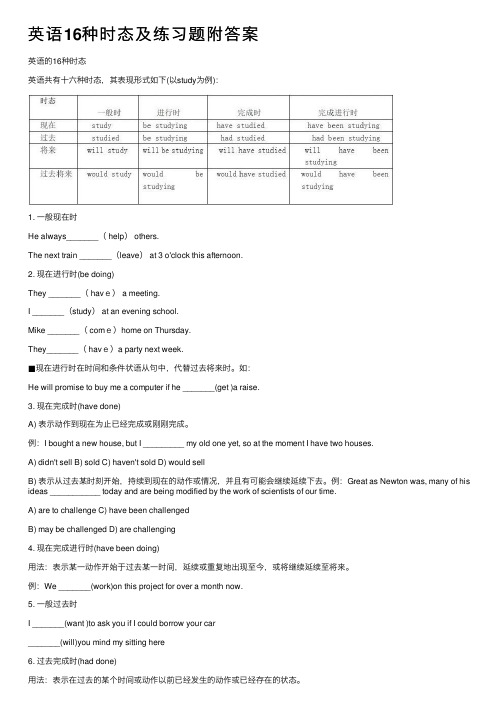
英语16种时态及练习题附答案英语的16种时态英语共有⼗六种时态,其表现形式如下(以study为例):1. ⼀般现在时He always_______( help) others.The next train _______(leave) at 3 o'clock this afternoon.2. 现在进⾏时(be doing)They _______( have) a meeting.I _______(study) at an evening school.Mike _______( come)home on Thursday.They_______( have)a party next week.■现在进⾏时在时间和条件状语从句中,代替过去将来时。
如:He will promise to buy me a computer if he _______(get )a raise.3. 现在完成时(have done)A) 表⽰动作到现在为⽌已经完成或刚刚完成。
例:I bought a new house, but I _________ my old one yet, so at the moment I have two houses.A) didn't sell B) sold C) haven't sold D) would sellB) 表⽰从过去某时刻开始,持续到现在的动作或情况,并且有可能会继续延续下去。
例:Great as Newton was, many of his ideas ___________ today and are being modified by the work of scientists of our time.A) are to challenge C) have been challengedB) may be challenged D) are challenging4. 现在完成进⾏时(have been doing)⽤法:表⽰某⼀动作开始于过去某⼀时间,延续或重复地出现⾄今,或将继续延续⾄将来。
四种时态练习及答案
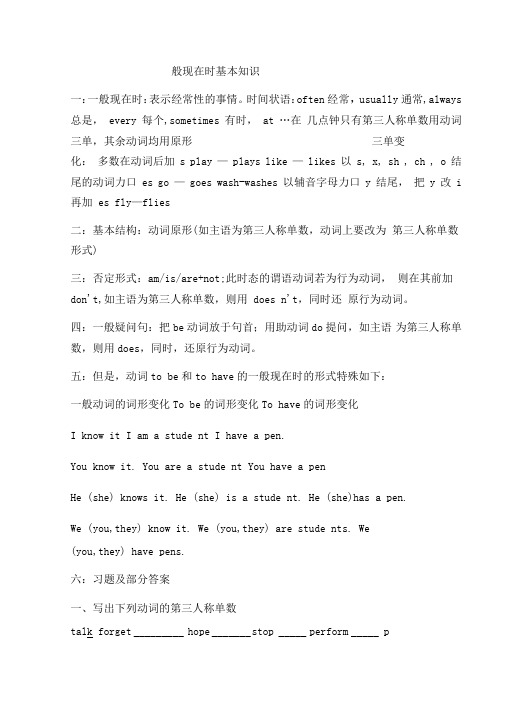
般现在时基本知识一:一般现在时:表示经常性的事情。
时间状语:often经常,usually 通常,always 总是, every 每个,sometimes 有时, at …在几点钟只有第三人称单数用动词三单,其余动词均用原形三单变化:多数在动词后加 s play — plays like — likes 以 s, x, sh , ch , o 结尾的动词力口 es go — goes wash-washes 以辅音字母力口 y 结尾,把 y 改 i 再加 es fly—flies二:基本结构:动词原形(如主语为第三人称单数,动词上要改为第三人称单数形式)三:否定形式:am/is/are+not;此时态的谓语动词若为行为动词,则在其前加don't,如主语为第三人称单数,则用 does n't,同时还原行为动词。
四:一般疑问句:把be动词放于句首;用助动词do提问,如主语为第三人称单数,则用does,同时,还原行为动词。
五:但是,动词to be和to have的一般现在时的形式特殊如下:一般动词的词形变化To be的词形变化To have的词形变化I know it I am a stude nt I have a pen.You know it. You are a stude nt You have a penHe (she) knows it. He (she) is a stude nt. He (she)has a pen.We (you,they) know it. We (you,they) are stude nts. We(you,they) have pens.六:习题及部分答案一、写出下列动词的第三人称单数talk forget _________ hope _______ s top _____ perform _____ play ______ s ay ______buy ______ w orry _____ fly _____ study _______ like ______ m ake _____take ______love ______ recite ______ become ________ come _______ drive ______shine _______leave ____ w ake ________ r ide ______ write ______ hike _____ give ___see ______ s wim ______ stop ______ s hop_______ plan ______ g et ______sit ______ l et ______cut _______ run ______ forget ______ begin ______ wash _____ watch_finish ____ teach ____ fish _______ r each _______ go ______ do _____ 二、用括号动词的适当形式填空。
时间状语从句讲解和练习(答案)

时间状语从句用句子表达一件事情或一个行为发生的时间,这个句子就叫时间状语从句。
时间状语从句根据其所表示的时间不同,所使用的连词也不同。
下面我们一起来看一下几个常见的时间状语从句:1.when引导的从句:表示主句的动作和从句的动作同时发生,或从句的动作发生在主句动作之前。
例如:I was going out when a visitor came. (动词动作同时发生。
)我正要出门,有客人来访。
I shall tell her the good news when she comes.她来时,我将告诉她这个好消息。
小试牛刀:I found mother cooking for me. I got home.(when)_______________________________________ He was listening to the radio when I home. (get)2.while 引导的从句:表示“当……过程中”,强调某一段时间内主句和从句中谓语动词所表示的动作在同一时期发生。
由于while从句表示一个持续的行为,所以从句中要用持续性动词,并且持续性动词常用进行时态。
例如:Keep an eye on my little sister while I am away.我不在时,请照看一下我的小妹妹。
While we were watching TV, Jim came in. 我们看电视的时候,Jim进来了。
小试牛刀:It started to rain. We were playing football.(while)_______________________________________ Lucy was cleaning the room Lily was listening to music.3.as引导的时间状语从句:表示“当……的时候;一边……一边……;随着……”,其从句的主语与主句的主语往往是同一人或物。
初中时间状语从句语法及练习

初中时间状语从句语法及练习英语时间状语从句讲解与练习(一)when, while 和as 引导时间状语从句的用法一、when 的用法如果只从现象来看,when 从句用的最多的是一般过去时,而主句的时态没有限制,根据具体情况而定。
1. When he was a child he was always trying out new ideas.他小时候就常常试验一些新的设想。
2. When she came into my room, I was just reading a book. 她走进我房间时,我正在看书。
3. Were you writing when the teacher came in? 老师进来的时候,你在写信吗?4. Sorry, I was out when you called me. 对不起,你打电话来的时候我出去了。
5. He was on the point of leaving when someone knocked at the door.他正要走,这时有人敲门。
6. I thought of it just when you opened your mouth. 就在你要说话的时候,我也想到了。
7. I had hardly[scarcely] closed my eyes when someone knocked at the door.我刚一闭上眼,就有人在敲门了。
根据以上的例句,我们可以总结出一点:when 从句的A事件,相当于另一个事件B发生的时间点。
也就是说,when 从句的重点不在动作本身发生的状态,而只是把它作为一个时间点,所以when 多数情况下用的是一般过去时,则不用正在进行时。
因为如果用正在进行时,它表示的就是一段时间而不是一个时间点了。
根据这一点,有的文章补充说:when 从句的动词大多是瞬时动词。
这种说法也可以参照。
实际上,when 从句也可以有其它的时态,但几乎也不用进行时,因为它也只是作为一个时间参照点。
英语十六大时态总结及相关练习题
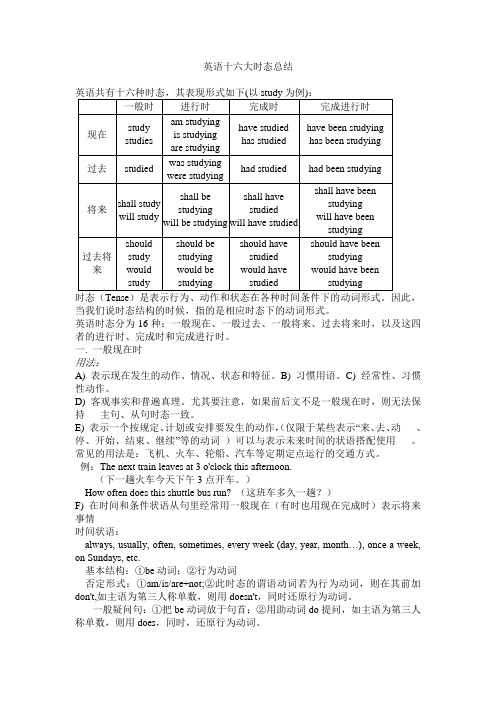
英语十六大时态总结当我们说时态结构的时候,指的是相应时态下的动词形式。
英语时态分为16种:一般现在、一般过去、一般将来、过去将来时,以及这四者的进行时、完成时和完成进行时。
一. 一般现在时用法:A) 表示现在发生的动作、情况、状态和特征。
B) 习惯用语。
C) 经常性、习惯性动作。
D) 客观事实和普遍真理。
尤其要注意,如果前后文不是一般现在时,则无法保持主句、从句时态一致。
E) 表示一个按规定、计划或安排要发生的动作,(仅限于某些表示“来、去、动、停、开始、结束、继续”等的动词)可以与表示未来时间的状语搭配使用。
常见的用法是:飞机、火车、轮船、汽车等定期定点运行的交通方式。
例:The next train leaves at 3 o'clock this afternoon.(下一趟火车今天下午3点开车。
)How often does this shuttle bus run? (这班车多久一趟?)F) 在时间和条件状语从句里经常用一般现在(有时也用现在完成时)表示将来事情时间状语:always, usually, often, sometimes, every week (day, year, month…), once a week, on Sundays, etc.基本结构:①be动词;②行为动词否定形式:①am/is/are+not;②此时态的谓语动词若为行为动词,则在其前加don't,如主语为第三人称单数,则用doesn't,同时还原行为动词。
一般疑问句:①把be动词放于句首;②用助动词do提问,如主语为第三人称单数,则用does,同时,还原行为动词。
二. 一般过去时用法:A) 表示过去某个时间发生的动作或情况。
B) 表示过去习惯性动作。
特别是由would/ used to do表达的句型,本身表示的就是过去时。
He used to visit his mother once a week.(他以前总是每周看望一次他的母亲。
动词时态在时间状语从句中的特殊用法
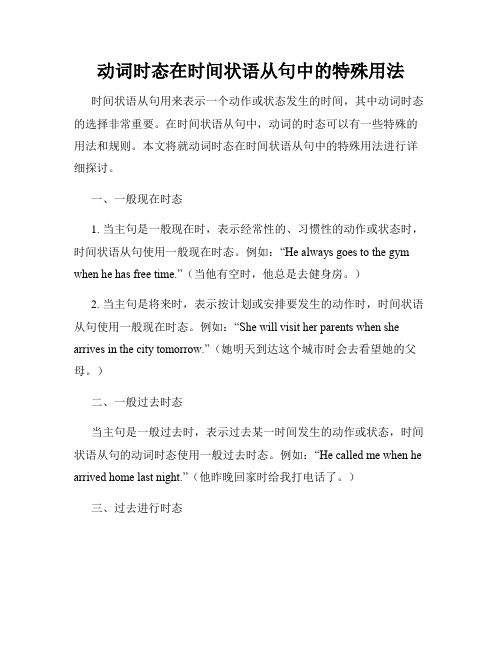
动词时态在时间状语从句中的特殊用法时间状语从句用来表示一个动作或状态发生的时间,其中动词时态的选择非常重要。
在时间状语从句中,动词的时态可以有一些特殊的用法和规则。
本文将就动词时态在时间状语从句中的特殊用法进行详细探讨。
一、一般现在时态1. 当主句是一般现在时,表示经常性的、习惯性的动作或状态时,时间状语从句使用一般现在时态。
例如:“He always goes to the gym when he has free time.”(当他有空时,他总是去健身房。
)2. 当主句是将来时,表示按计划或安排要发生的动作时,时间状语从句使用一般现在时态。
例如:“She will visit her parents when she arrives in the city tomorrow.”(她明天到达这个城市时会去看望她的父母。
)二、一般过去时态当主句是一般过去时,表示过去某一时间发生的动作或状态,时间状语从句的动词时态使用一般过去时态。
例如:“He called me when he arrived home last night.”(他昨晚回家时给我打电话了。
)三、过去进行时态当主句是过去进行时,表示过去某一时间正在进行的动作,时间状语从句的动词时态使用过去进行时态。
例如:“I was studying when she called me yesterday.”(昨天她给我打电话时,我正在学习。
)四、现在完成时态当主句是现在完成时,表示过去某一时间发生并与现在有关的动作或状态,时间状语从句的动词时态使用现在完成时态。
例如:“She has already left when I arrived home.”(我回到家时,她已经离开了。
)五、将来完成时态当主句是将来完成时,表示将来某一时间之前已经完成的动作或状态,时间状语从句的动词时态使用将来完成时态。
例如:“I will have graduated when you come back next year.”(明年你回来时,我已经毕业了。
高中英语时态及练习

高中英语时态及练习一、一般现在时1、表示现在发生的动作或存在的状态,常与every day,once a week,in the morning,at present等连用。
例:They don’t usually have enough money to go to the movies.2、表示主语具备的性格和能力等。
例:Mary can speak three languages.3、表示经常性或习惯性的动作,常与always,never,sometimes,often等连用。
例:I never eat fast food.4、表示现在提出的建议或要求。
例:Could you please help me with my math homework?二、现在进行时1、表示正在发生的动作或存在的状态。
例:He is studying for his history exam.2、表示现阶段正在进行的动作,但这个动作不一定正在进行。
例:My brother is preparing for his college entrance exams.3、表示即将发生的动作,常与表示将来的时间副词连用。
例:We are about to start our journey.三、现在完成时1、表示过去发生的动作对现在造成的结果。
例:I have just finished my homework.2、表示过去开始一直持续到现在的动作或状态,并可能继续下去。
例:They have been married for 20 years.四、一般过去时1、表示过去某个时间发生的动作或存在的状态。
例:We saw a movie last night.2、表示过去经常或反复发生的动作。
例:He always went to the park in the morning.高中英语时态练习英语时态是英语语法中非常重要的一个部分,也是我们在学习英语过程中必须要掌握的知识。
初中英语八大时态全套精讲及练习题(附答案)
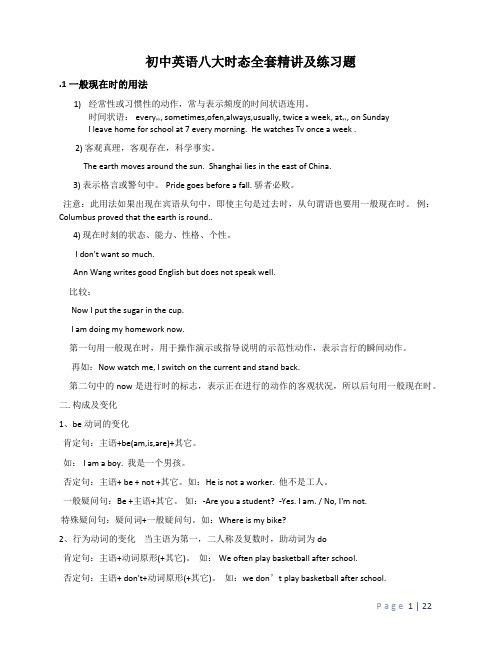
初中英语八大时态全套精讲及练习题.1 一般现在时的用法1)经常性或习惯性的动作,常与表示频度的时间状语连用。
时间状语: every…, sometimes,ofen,always,usually, twice a week, at…, on SundayI leave home for school at 7 every morning. He watches Tv once a week .2) 客观真理,客观存在,科学事实。
The earth moves around the sun. Shanghai lies in the east of China.3) 表示格言或警句中。
Pride goes before a fall. 骄者必败。
注意:此用法如果出现在宾语从句中,即使主句是过去时,从句谓语也要用一般现在时。
例:Columbus proved that the earth is round..4) 现在时刻的状态、能力、性格、个性。
I don't want so much.Ann Wang writes good English but does not speak well.比较:Now I put the sugar in the cup.I am doing my homework now.第一句用一般现在时,用于操作演示或指导说明的示范性动作,表示言行的瞬间动作。
再如:Now watch me, I switch on the current and stand back.第二句中的now是进行时的标志,表示正在进行的动作的客观状况,所以后句用一般现在时。
二. 构成及变化1、be动词的变化肯定句:主语+be(am,is,are)+其它。
如: I am a boy. 我是一个男孩。
否定句:主语+ be + not +其它。
如:He is not a worker. 他不是工人。
各种时态的时间状语及练习

与各种时态连用的时间状语一、常与一般现在时连用的时间状语:1、副词:always often never sometimes usually2、短语:every day / week / month / year once a week hardly everevery ten minutes 每十分钟every other ten minutes 每隔十分钟now and then 不时from time to time 不时另:客观事实、客观真理只用一般现在时eg: He always stud ies very hard。
They sometimes go to school on foot.Ken doesn’t clean his teeth every day.The No. 2 bus pass es here every fifteen minutes.Do you visit your uncle now and then?二、常与一般过去时连用的时间状语:1、副词:yesterday2、短语:last week / month / year / night last Mondayyesterday morning / afternoon / evening last Mayjust now = a moment ago two days agothe day before yesterday the other day 前几天in (已过去的)某年/ 月on (已过去的)某天at (已过去的)几点钟与某些从句连用eg:He always stud ied hard last year。
Mr。
Smith came to see our teacher yesterday afternoon.Did you meet him the other day?They left here at 8:00。
英语时态总结及习题(最全)

五、现在完成时1.概念:过去发生或已经完成的动作对现在造成的影响或结果,或从过去已经开始,持续到现在的动作或状态。
2.时间状语:yet,already,just,never,ever,so far,by now,since+时间点,for+时间段,recently, lately, in the past few years, etc.3.基本结构:主语+have/has +p.p(过去分词)+其他4.否定形式:主语+have/has + not +p.p(过去分词)+其他5.一般疑问句:have或has。
6.例句:I've written an article.The countryside has changed a lot in the past few years.基础练习一、选择填空1.—Have you got any pieces of paper?—Yes, I _____ .A. have gotB. haveC. had oneD. did2.Have you ever _____ to a foreigner?A. speakB. spokeC. spokenD. to speak3.Let’s forget _____ thing.A. the allB. all theC. whole theD. the whole4.Can you find the answer _____ the question?A. toB. ofC. inD. at5.She’s never read the book before, _____ ?A. has sheB. hasn’t sheC. isn’t sheD. wasn’t she?二、用所给动词的适当形式填空1.I ____ just ____ (finish) my homework.2.He ____ (go) to school on foot every day.3. ____ you ____ (find) your science book yet?4.If it ____ (be) fine tomorrow, I’ll go with you.5.She doesn’t like the childr en ____ (play) in the room.6.The students ____ (read) English when the teacher came in.7.Look! The monkey ____ (climb) the tree.8.My mother ____ (come) to see me next Sunday.9.How many sheep ____ you ____ (get)? Only one.10.I’ve lost my pen. ____ you ____ (see) it anywhere?强化练习一、单项选择。
4种时态(一般现在时_一般过去时_一般将来时_现在进行时)的时间状语及用法

四种时态的时间状语及用法一般现在时1.用法:1)表示经常性、习惯性的动作或状态2)表示事物或人物的特征、状态3)表示客观事实2.谓语动词:do/does(动词原形\动词第三人称单数形式)3.时间状语:always,usually, often,sometimes,never, at times(偶尔), oncea week,every…(every day,every morning, every year…) on Sundays,,on weekends注意:当主语是第三人称单数时,谓语动词要用第三人称单数形式一般过去时1.用法:1)表示在过去的时间发生的动作或存有的状态2)表示过去经常或反复发生的动作(能够和often,always等表示频率的时间副词连用)2.谓语动词:did(动词过去式)3.时间状语:yesterday, the day before yesterday(前天) ,two days ago, last week,in 2008附:常见动词及其过去式一般将来时1.用法:1)表示将来的时间要发生的动作或存有的状态2)表示打算、计划、决定要做某事2.谓语形式:will/shall+动词原形/be going to +动词原形3.时间状语:next week,this Sunday,next time,tomorrow,the day after tomorrow(后天),现在实行时1.用法:1)表示现在(说话瞬间)正在实行或发生的动作2)表示当前一段时间内的活动或现阶段正在实行的动作2.谓语形式:am/is/are+动词ing形式3.时间状语:now,these days(这几天)附:常见动词及其-ing形式。
英语八大时态介绍(附练习题)

英语八大时态介绍一般现在时一般现在时基本用法介绍:(一)一般现在时的功能1.表示事物或人物的特征、状态。
如:The sky is blue.天空是蓝色的。
2.表示经常性或习惯性的动作。
如:I get up at six every day.我每天六点起床。
3.表示客观现实。
如:The earth goes around the sun.地球绕着太阳转。
(二)一般现在时的构成1.be动词:主语+be(am,is,are)+其它。
如:I am a boy.我是一个男孩。
2.行为动词:主语+行为动词(+其它)。
如:We study English.我们学习英语。
当主语为第三人称单数(he, she,it)时,要在动词后加"-s"或"-es"。
如:Mary likes Chinese.玛丽喜欢汉语。
(三)一般现在时的变化1. be动词的变化。
否定句:主语+ be + not +其它。
如:He is not a worker.他不是工人。
一般疑问句:Be +主语+其它。
如:-Are you a student? -Yes. I am. / No, I'm not.特殊疑问句:疑问词+一般疑问句。
如:Where is my bike?2.行为动词的变化。
否定句:主语+ don't( doesn't ) +动词原形(+其它)。
如:I don't like bread.当主语为第三人称单数时,要用doesn't构成否定句。
如:He doesn't often play.一般疑问句:Do( Does ) +主语+动词原形+其它。
如:- Do you often play football?当主语为第三人称单数时,要用does构成一般疑问句。
如:- Does she go to work by bike? - Yes, she does. / No, she doesn't.特殊疑问句:疑问词+一般疑问句。
初中八种重要时态常用的时间状语

初中八种重要时态常用的时间状语一、The Present Indefinite Tense(一般现在时)(一)句型转换。
1、含be动词的句型转换肯定句:S2+is+.../I+am+.../S1+are+...否定句:S2+is + not +.../I+ am +not+.../S1 +are +not+...一般疑问句:Is +S2+...?肯定回答:Yes,he/she/it is.否定回答:No,he/she/it isn't.Am+I/Are+you+...?肯定回答:Yes,I am./否定回答:No,I'm not.Are +S1+...?肯定回答:Yes, we/you/they are.否定回答:No,we/you/they aren't.2、含实意动词do的句型转换肯定句:S2 +does.../S1+ do...否定句:S2+doesn't +do+.../S1+don't + do+...一般疑问句:Does+S2+do+...?肯定回答:Yes,he/she/it does. 否定回答:No,he/she/it doesn'tDo +S1+do+...?肯定回答:Yes,I/we/you/they do./否定回答:No,I/we/you/they don't.3、含实意动词V的句型转换肯定句:S2 +Ves.../S1+ V...否定句:S2+doesn't +V+.../S1+don't + V+...一般疑问句:Does+S2+V+...?肯定回答:Yes,he/she/it does. 否定回答:No,he/she/it doesn'tDo +S1+V+...?肯定回答:Yes,I/we/you/they do./否定回答:No,I/we/you/they don't.4、含there be动词的句型转换肯定句:There is...There are否定句:There is not...There are not...一般疑问句:Is there ...?肯定回答:Yes,there is.否定回答:No,there isn'tAre there ...?肯定回答:Yes,there are.否定回答:No,there aren't.注意:肯定句改为一般疑问句时:①I/we/me/us→you,my/our→your,mine/ours→yours),三人称不变), ②改be 动词的am为are,改句号为问号),③改相应的词(some→any,and→or,very much/a lot/a little→at all)(S1第一类主语):除三人称单数外的代词I/you/we/they相当于we/you/they的专有名词(Lucy and I(we), you an Lily(you),Lucy and Lily(they)和相当于they的复数名词(these boys/men/birds等时,在一般现在时,动词用原形(S2第二类主语):三人称单数代词he/she/it,相当于he/she/it的单个人名/地名Lucy(she),Jim(he) China(it)及相当于he/she/it的名词this boy(he)that girl (she) the cat(it)等,在一般现在时中,动词用三单现。
(完整版)初一英语各种时态复习及练习题
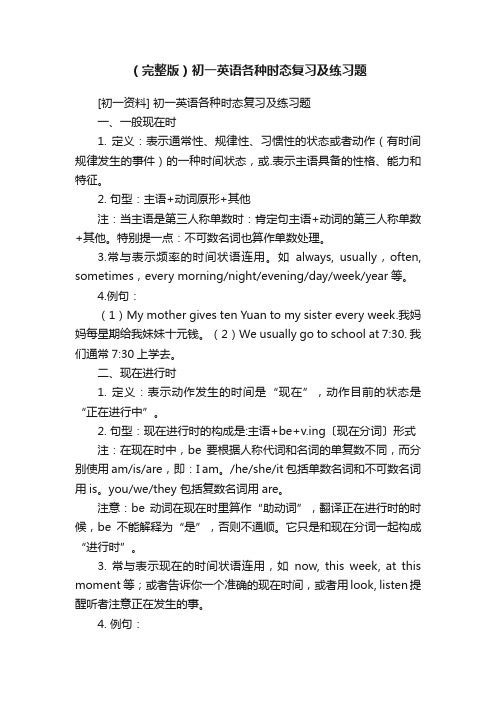
(完整版)初一英语各种时态复习及练习题[初一资料] 初一英语各种时态复习及练习题一、一般现在时1. 定义:表示通常性、规律性、习惯性的状态或者动作(有时间规律发生的事件)的一种时间状态,或.表示主语具备的性格、能力和特征。
2. 句型:主语+动词原形+其他注:当主语是第三人称单数时:肯定句主语+动词的第三人称单数+其他。
特别提一点:不可数名词也算作单数处理。
3.常与表示频率的时间状语连用。
如always, usually,often, sometimes,every morning/night/evening/day/week/year等。
4.例句:(1)My mother gives ten Yuan to my sister every week.我妈妈每星期给我妹妹十元钱。
(2)We usually go to school at 7:30. 我们通常7:30上学去。
二、现在进行时1. 定义:表示动作发生的时间是“现在”,动作目前的状态是“正在进行中”。
2. 句型:现在进行时的构成是:主语+be+v.ing〔现在分词〕形式注:在现在时中,be 要根据人称代词和名词的单复数不同,而分别使用am/is/are,即:I am。
/he/she/it 包括单数名词和不可数名词用is。
you/we/they 包括复数名词用are。
注意:be 动词在现在时里算作“助动词”,翻译正在进行时的时候,be不能解释为“是”,否则不通顺。
它只是和现在分词一起构成“进行时”。
3. 常与表示现在的时间状语连用,如now, this week, at this moment 等;或者告诉你一个准确的现在时间,或者用look, listen提醒听者注意正在发生的事。
4. 例句:(1)They are playing basketball now.现在他们正在打篮球。
(2)Listen! She is singing a song.听,她正在唱歌。
英语六大时态归纳与练习(含答案)
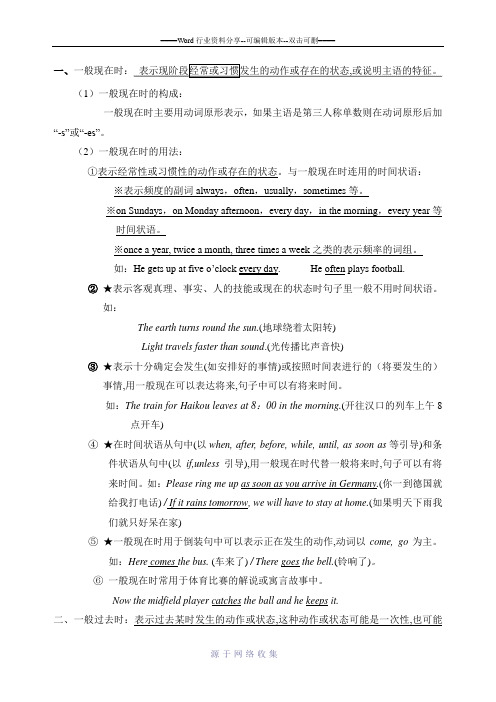
一、(1)一般现在时的构成:一般现在时主要用动词原形表示,如果主语是第三人称单数则在动词原形后加“-s”或“-es”。
(2)一般现在时的用法:①表示经常性或习惯性的动作或存在的状态。
与一般现在时连用的时间状语:※表示频度的副词always,often,usually,sometimes等。
※on Sundays,on Monday afternoon,every day,in the morning,every year等时间状语。
※once a year, twice a month, three times a week之类的表示频率的词组。
如:He gets up at five o’clock every day. He often plays football.②★表示客观真理、事实、人的技能或现在的状态时句子里一般不用时间状语。
如:The earth turns round the sun.(地球绕着太阳转)Light travels faster than sound.(光传播比声音快)③★表示十分确定会发生(如安排好的事情)或按照时间表进行的(将要发生的)事情,用一般现在可以表达将来,句子中可以有将来时间。
如:The train for Haikou leaves at 8:00 in the morning.(开往汉口的列车上午8点开车)④★在时间状语从句中(以when, after, before, while, until, as soon as等引导)和条件状语从句中(以if,unless引导),用一般现在时代替一般将来时,句子可以有将来时间。
如:Please ring me up as soon as you arrive in Germany.(你一到德国就给我打电话) / If it rains tomorrow, we will have to stay at home.(如果明天下雨我们就只好呆在家)⑤★一般现在时用于倒装句中可以表示正在发生的动作,动词以come, go为主。
高考英语状语从句和动词时态详解及练习
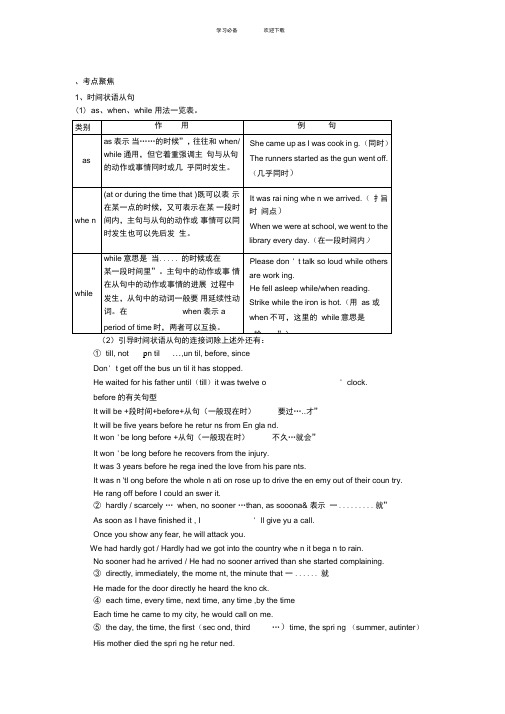
、考点聚焦1、时间状语从句(1) as、when、while 用法一览表。
(2)引导时间状语从句的连接词除上述外还有:①till, not p n til …,un til, before, sinceDon' t get off the bus un til it has stopped.He waited for his father until(till)it was twelve o ' clock.before的有关句型It will be +段时间+before+从句(一般现在时)要过…..才”It will be five years before he retur ns from En gla nd.It won 'be long before +从句(一般现在时)不久…就会”It won 'be long before he recovers from the injury.It was 3 years before he rega ined the love from his pare nts.It was n 'tl ong before the whole n ati on rose up to drive the en emy out of their coun try.He rang off before I could an swer it.②hardly / scarcely … when, no sooner …than, as sooona& 表示一......... 就”As soon as I have finished it , I ' ll give yu a call.Once you show any fear, he will attack you.We had hardly got / Hardly had we got into the country whe n it bega n to rain.No sooner had he arrived / He had no sooner arrived than she started complaining.③directly, immediately, the mome nt, the minute that 一...... 就He made for the door directly he heard the kno ck.④each time, every time, next time, any time ,by the timeEach time he came to my city, he would call on me.⑤the day, the time, the first(sec ond, third …)time, the spri ng (summer, autinter)His mother died the spri ng he retur ned.注意:表示未来情况,主句用将来时,从句用现在时。
中考英语八大时态精解+精练+答案

中考英语八大时态精解+精练+答案一、一般现在时1、概念:表示经常发生的情况;有规律出现的情况;总是发生的;事实真理。
2.时间状语:Always, usually, often, sometimes, every week (day, year, month…), once a week (day, year, month…), on Sundays (on Mondays…), etc.3.基本结构:主语+动词原形(如主语为第三人称单数,动词上要改为第三人称单数形式)4.否定形式:主语+am / is / are+not+其他;此时态的谓语动词若为行为动词,则在其前加don't,如主语为第三人称单数,则用doesn't,同时还原行为动词。
5.一般疑问句:把be 动词放于句首;用助动词do 提问,如主语为第三人称单数,则用does,同时,还原行为动词。
eg:①It seldom snows here. 这里很少下雪。
②He is always ready to help others. 他总是乐于帮助别人。
③Action speaks louder than words. 事实胜雄辩。
二、一般过去时1.概念:过去某个时间里发生的动作或状态;过去习惯性、经常性的动作、行为。
2.时间状语:ago,yesterday,the day before yesterday,last week,last (year,night,month…), in 1989, just now, at the age of 5, one day, long long ago, once upon a time,etc.3.基本结构:主语+动词的过去式或be 的过去式+名词4.否定形式:主语+was / were+not+其他;在行为动词前加didn't,同时还原行为动词。
5.一般疑问句:was 或were 放于句首;用助动词do 的过去式did 提问,同时还原行为动词。
与各种时态连用的时间状语

与各种时态连用的时间状语一、常与一般现在时连用的时间状语:1、副词:always often never sometimes usually2、短语:every day / week / month / year once a week hardly everevery ten minutes 每十分钟every other ten minutes 每隔十分钟now and then 不时from time to time 不时另:客观事实、客观真理只用一般现在时eg: He always stud ies very hard.They sometimes go to school on foot.Ken doesn’t clean his teeth every day.The No. 2 bus pass es here every fifteen minutes.Do you visit your uncle now and then?附:一般现在时的基本句型:肯定句:He / She / It / sb. does sth.否定句:He / She / It / sb. doesn't do sth.疑问句:Does he / she / it / sb. do sth.?肯定句:I / You / We / They / 复数名词do sth.否定句:I / You / We / They / 复数名词don't do sth.疑问句:Do I / You / We / They / 复数名词do sth.?二、常与一般过去时连用的时间状语:1、副词:yesterday2、短语:last week / month / year / night last Mondayyesterday morning / afternoon / evening last Mayjust now = a moment ago two days agothe day before yesterday the other day 前几天in (已过去的)某年/ 月on (已过去的)某天at (已过去的)几点钟与某些从句连用eg: He always stud ied hard last year.Mr. Smith came to see our teacher yesterday afternoon.Did you meet him the other day?They left here at 8:00.Andrew’s father went to Australia in 1978.He went to sleep after he finished his homework.I didn’t hear from him a week ago.The sports meet began on September 20.附:一般现在时的基本句型:肯定句:sb. did sth.否定句:sb. didn't do sth.疑问句:Did sb. do sth.?三、常与现在进行时( is / am / are doing )连用的时间状语:1、副词:now2、某些警示性动词如:look listeneg: Look! They are playing football.He isn’t reading English now.四、常与一般将来时( will / shall / be going to do )连用的时间状语:1、副词:tomorrow2、短语:next Sunday / week / month / year how soonin + 时间段/ (将来的) 某年/ 月after + 时间点on (将来的) 某天in the futureeg: We will have an English Evening tomorrow.He’ll be back in two hours.Our school will build another library in 2004.Tom will leave for Beijing after 9: 00 o’clock.at 9: 00 o’clock.How soon will you write to Anne?She will be ten years old on Saturday next week.五、现在完成时与一般过去时、一般现在时的区别:现在完成时强调的是动作虽发生或开始在过去,但跟现在有联系一般过去时则强调A)过去某一具体动作,可配过去的具体时间B)过去某一时间内经常发生的动作一般现在时强调现在时间内经常发生的动作或客观事实e.g.: I have done all my homework.I did my homework last night.I often did my homework before dinner last month.I often do my homework before dinner.He works as an engineer in a company.It never snows in Hainan Island.EXERCISES:I.Fill in the blanks with the proper forms of the following words:1.Mary usually _____________ (get) up early in the morning.2.I ____________________ (call) him in half an hour.3.Sue ______________________ ( not do ) any washing last year.4.Listen! Someone _________________________ (knock) at the door.5.They _________________________ (swim) in the river at this time yesterday.6.He ________________________ (not book) the court yet.7.Lucy and Lily ______________________ (not come) to my party tomorrow evening.8.My pencil ______________ (break) while I ______________________ (draw) a horse.9.They _____________________ (play) football when I ___________ (see) them.10.He told the child that the sun ____________ ( go ) down in the west.11.What will he be when he _____________ (grow) up?12.We won’t begin our work until he ___________ (come).13.Sue __________________ (join) the match of next July.14.How long ______________ he ____________ (arrive) at the station?15.How soon __________ he ____________ (arrive)?16.My father ________________ (work) as a doctor ten years ago.17.He never ____________ (tell) a lie when he ___________ (be) a child.18.Sometimes last year, my parents ____________ (come) home very late.19.The baby ______________ (drink) water every two hours.20.He ________________ (call) me every other twenty minutes yesterday.21.It _______________ (snow) heavily on the morning of last Saturday.22.By the end of last year, they ___________________ (write) five songs.23.He ___________ just _____________ (draw) a map.24.They _______________________ (not hand) in their homework the other day.25.He _________________________ (not come) here since last month.26.Next week, I _______________________ (stay) with my aunt for two days.27.Peter and Tim _____________________________ (not have) class at nine yesterday.28.I _________________________ (return) you the book in three days.29.Look! They ____________________________ (not clean) the windows at all!II.Multiple choice:1.What _____ you ______ at this time last Sunday?A. did...doB. have...doneC. were...doingD. are...doing2.He said the train ______ faster than any man.A. runB. runsC. ranD. is running3.How long ___ he ____ in Shenzhen?A. eB. has...arrivedC. will...reachD. has...been4.Many people often _____ rice for supper in south China.A. haveB. hasC. hadD. are having5.She ___ always ___ angry with nothing.A. is...beingB. will...beC. is.../D. /...is6.I didn’t know a word of English until I ____ here.A. cameB. have comeC. had comeD. was coming7.I ____ you about that many times.A. toldB. tellC. have toldD. am telling8.Water _____ at 100 0 C.A. boilsB. is boilingC. has boiledD. boiled9.Ken ___ up at 6:30 in the morning.A. gotB. getC. getsD. is getting10.How many English words ____ you _____?A. do...learnB. has...learnedC. have...learnedD. will...learn11.I ____ him just now.A. seeB. sawC. have seenD. am seeing12.He ____ his best to learn English well.A. doesn’tB. hasn’t doneC. doD. doesn’t do13.Her new shoes _______ under the bed.A. isB. areC. wasD. am14.Where ____ you _____? I’ve looked for you the whole morning.A. have...goneB. did...go toC. are...goingD. have...been15.I ____ him but I ____ to him.A.see...didn’t speakB. saw...spokeC. have seen...haven’t spokenD. saw...didn’t speakI. Choose the right answers to cloze.用括号内适当的形式填空。
初中英语语法八种时态详解与练习

初中英语语法:八种时态详解与练习一.概念:英语中表示不同时间发生的动作或存在的状态,需用不同的动词形式表示, 这种不同的动词形式称为时态;二.种类:基本时态一般现在时一般过去时现在进行时过去进行时一般将来时过去将来时现在完成时过去完成时一般现在时一、概念:经常、反复发生的动作或行为及现在的某种状况;二、常搭配的时间状语:always, usually, often, sometimes, every week day, year, month, once a week,on Sundays, etc.三、基本结构①be动词is,am,are;②行为动词主语是第三人称单数时谓语动词要加s或es外否定形式:①am/is/are+not;②此时态的谓语动词若为行为动词,则在其前加don't,如主语为第三人称单数,则用doesn't,同时还原行为动词;一般疑问句:①把be动词放于句首;②用助动词do提问,如主语为第三人称单数,则用does,同时,还原行为动词;例句:I go to school at 6 every morning. 每天早上我七点去上学;Summer follows spring. 春天之后是夏天;I learned that the earth goes around the sun when I was in primary school. 我在小学就学过地球是围绕太阳转的;Pride goes before a fall. 骄者必败;四、基本用法:1 描述当前时间内经常出现、反复发生的动作或存在的状态;在这种情景中,句子常带有表示频率的时间状语:always , everyday , often , once a week month , year , etc. , sometimes , seldom , usually等等,以表示句中的动作或状态是习惯性的、经常性的;例如:They raise ducks as a sideline .他们以养鸭为副业;She doesn't often write to her family, only once a month. 她不常给家里写信,仅一月一封而已;I cycle to work every day .我每天骑自行车上班;It seldom rains here .这儿很少下雨;2仅为了描述状态、性质、特征、能力等等;这里的目的是为了"描述现阶段的动作或状态",其重点"不是强调动作发生的时间、或进行的状态";例如:He can speak five foreign languages .他能说五种外语;That is a beautiful city .那是座美丽的城市;Changjiang River is one of the longest rivers in the world. 长江是世界上最长河流之一;She majors in music .她主修音乐;All my family love football .我全家人都喜欢足球;强调每个家人My sister is always ready to help others . 我妹妹总是乐于助人;3 陈述客观事实、客观真理;顾名思义,客观的情况是"没有时间概念"的;也"不会在意动作进行的状态";例如:The earth goes around the sun .地球绕着太阳转;Ten minus two is eight.十减二等于八;Light travels faster than sound .光的速度比声音的速度快;The United States lies by the west coast of the Pacific Ocean. 美国位于太平洋西岸;4 根据英文语法规定,当主句的谓语动词是一般将来时,那么时间或条件状语从句的谓语动词只能用一般现在时来表示将来要发生的动作;例如:I'll tell him the news when he comes back. 他回来时,我将告诉他这个消息;If you take the job , they will talk with you in greater details.如果你接受这份工作,他们将和你谈谈细节;用于一般现在时的副词,除了上面提到的一些表示频率的词以外,常见的还有:now, today , nowadays等等;练习题:用动词的适当形式填空:absent today begoto school at seven in the morning.mother________like ______go shopping.can ________draw many beautiful pictures.he_________like_________jumpstudents___________speak English in class.student_________speak Chinese after class.8. Let's____________and play football . go9. He_____________ like swimming . not10. __________your sister study English at school No , she__________ . do用所给动词的适当形式填空:1.I ______________write to you as soon as I _______get to London.2. He doesn't feel well and ____________not eat any food this morning.3. He ______ not _______see me come in, for he ___________read something with great interest.4. Don't make a niose. Grandpa __________sleep.5. It ________take me two hours to finish my homework last night.6. What ______ your mother _______do at eight yesterday evening She _______wash clothes.7. _______ it _________ rain when school was over yesterday8 The teacher told us the earth __________ move round the sun.单项选择:students will go to the Summer Palace if it _____ tomorrow.'t rain B. doesn't rain C. won't rain3. The picture _______ nice.looked looking4. She ______ down and soon fell asleep. A. live B. lain C. laid D. lay6. We shall go to Shanghai on business before you _____ back next week.A. wil comeB. cameC. would comeD. come7. Don't smoke until the plane ______ off. taken take8. I saw her ____ the room this morning. enter B. entered C. enter D. enters11. He told us ______ at eight. A. working B. to work C. work D. worked12. You'd better ______ at home and ______ your homework.A. to stay, doB. stay, doC. to stay, to doD. stay, to do14. Uncle Wang knows _______ a washing machine.A. how to makeB. to makeC. how makingD. what to make15. Jim decided _______ Polly to Ling Feng when he was back to England.A. to leaveB. leftC. leavingD. leave4改句子1. We have four lessons.否定句have many books. 改为否定句Shan's sister likes playing table tennis 改为否定句lives in a small town near New York. 改为一般疑问句watch TV every day. 改为一般疑问句has got a goal. 改为一般疑问句have four lessons.否定句does his homework at home. 否定句: 一般疑问句: 划线提问usually play football on Friday afternoon. 否定句: 一般疑问句: 划线提问一般过去时一、概念:过去某个时间里发生的动作或状态;过去习惯性、经常性的动作、行为;二、常搭配的时间状语:ago, yesterday, the day before yesterday, last weekyear, night, month, in 1989, just now, at the age of 5, one day, long long ago, once upon a time, etc.三、基本结构:①be动词的过去式was/were;②行为动词的过去式即在动词原形后加ed,不规则变化的动词除外否定形式:①was/were+not;②在行为动词前加didn't,同时还原行为动词;一般疑问句:①was或were放于句首;②用助动词do的过去式did 提问,同时还原行为动词;一般过去时用谓语动词的过去式构成,即在动词原形后加ed,不规则变化的特殊动词除外;例句:He was here just now. 他刚才还在这里;What did you do yesterday 你昨天做了什么事We often played together when we were children. 我们小时候常在一起玩;He used to smoke a lot, but he doesn’t now. 他过去经常抽烟,但现在不抽了;四、基本用法主要是用来描述在过去某个时候发生的动作或存在的状态;它也可以用来表示在过去某段时间里经常发生的习惯性动作;这一点在表达意义上与一般现在时相同,只是所在的时间区域不同而已;由于它的主要作用如此,所以在使用一般过去时的句子里常常有一个意义较具体的过去时间状语;这也是它与现在完成时的最大区别之一;常和一般过去时连用的过去时间状语有:last night week ,month , year , century , etc. , yesterday , the day before yesterday , yesterday morning afternoon , evening , in 1999 , two hours ago one week ago , tree years ago , …等等;使用一般过去时,在某种意义上说就是要强调动作或状态发生或存在于过去的某个时候;"过去"的时间概念有两层意思:一是指"现在某个时间"以前的时间;二是指"说话、写文章的那个时间点"以前的时间,在这个意义上,"现在的那个时间点"是很小很小的,甚至于小到无法量化的程度;例如:He got his driving license last month. 他上个月拿到了驾照;--Where's Jim 吉姆在哪里--He just went out.他刚刚出去;练习:写出下列动词的过去式is/am_________ fly_______ plant________ are ________ drink_________play_______ go________ make ________ do/does_________ worry________eat__________ draw________put ______ throw________ pass_______用be动词的适当形式填空1. The little dog _____ two years old this year.2. She _______ happy yesterday.3. They _______ glad to see each other last month.4. Today _____ the second of June. Yesterday ______ the first of June. It _____ Children's Day. All the students ______ very excited.句型变换:1 There was a car in front of the house just now.否定句:__________________________________________________________一般疑问句:__________________________________________________________ 肯定回答:__________________________________________________________否定回答:__________________________________________________________2 They played football in the playground.否定句:__________________________________________________________一般疑问句:__________________________________________________________ 肯定回答:__________________________________________________________否定回答:__________________________________________________________用所给动词的适当形式填空:1. I ______ watch a cartoon on Saturday.2. Her father _______ read a newspaper last night.3. It ____ be the 2nd of November yesterday. Mr White ___ go to his office by car.4. ______ you _______ visit your relatives last Spring Festival5. Gao Shan ________ put the book on his head a moment ago.6. Don't ______ the house. Mum _______ it yesterday. clean7. What _________ she _________ find in the garden last morningShe _________ find a beautiful butterfly.8. What _________ you ______ just now I _______ some housework. do9 We all _________ have a good time last night.10. She likes _________ newspapers, but she _________ a book yesterday. read11. He ___________ football now, but they _______ basketball just now. play句型转换:1、Lucy did her homework at home.改否定句Lucy ___________ ___________ her homework at home.2、He found some meat in the fridge冰箱.变一般疑问句___________ he __________ ___________ meat in the fridge3、She stayed there for a week.对划线部分提问__________ ___________ __________ she __________ there4、There was some orange in the cup.变一般疑问句_________ there ___________ orange in the cup中译英:1. 我过了一个忙碌但却刺激的周末;I _________ _________ __________ __________ exciting weekend.2 Jenny喜欢看书;昨晚她看了一本英语书;Jenny likes _________ __________. She _________ an English book last night.3. Emma每天都看电视;可是昨天他没有看;Emma __________ TV every day. But he _________ ___________ yesterday.4. 上周六他们做什么了他们做作业和购物了;What ________ they _________ _________ SaturdayThey _________ __________ homework and _________ __________.一般将来时一、概念:表示将要发生的动作或存在的状态及打算、计划或准备做某事;二、时间状语:tomorrow, next dayweek, month, year,soon, in a few minutes, by,the day after tomorrow, 等;三、基本结构①am/is/are/going to + do;②will/shall + do.否定形式:①was/were + not; ②在行为动词前加didn't,同时还原行为动词;一般疑问句:①be放于句首;②will/shall提到句首;如:Telephone me this evening. I’ll be at home. 今晚给我打电话,我会在家;I’ll shall/will do a better job next time. 下次我要干得好些;The car won’t start. 车开不了啦;Oil and water will not mix. 油和水没法混在一起;四、基本用法:主要用来描述将要发生的动作或存在于未来的情况;这里所说的“将来时间”是指“说话、写文章那一刻以后的时间”;它的表示方法主要有如下几种:1shall / will + 动词原形这种表示方法是说,动作在现在或目前还未发生,要在将来的某个时间内发生;它没有主观性,是“纯粹的将来动作”;例如:I shall / will not be free tomorrow .我明天没空;He will arrive here this evening .他今晚抵达这里;2 be am / is / are + going +不定式这种表示方法主要是说明A“说话人的意图、打算”;B“某种可能性”;例如:A He is going to spend his holidays in London . 他打算在伦敦度假;Who is going to speak first 谁先发言B It is going to rain soon .马上要下雨了;Is he going to collect any data for us 他会帮我们收集资料吗If you go to New Zealand, you are going to like the place. 如果你去新西兰,你会喜欢上那个地方的;3 be am / is / are + 不定式表示方法描述两钟情况:按计划安排要发生的动作,这个动作发生的时间一般不会很远;要求或命令他人做某事;例如:A The new bridge is to open to traffic in three days. 新桥三天后通车;The factory is to go into production before National Day. 这家工厂国庆节前投产;B You are not to bring any mobile communication means into the exam-room . 任何移动通讯工具都不得带入考场;You are to stay home until your mother comes back. 你妈回来之前你不要出去;4 用一般现在时或现在进行时限于某些动词表示按计划安排要发生的事;主要强调“按计划安排要发生的事”;例如:Do you get off at the next stop 你下一站下车吗The plane takes off at 11:00 . 那架飞机上午十一点起飞;Mr. Reider is leaving for New York next week. 里德先生下周动身去纽约;五、表示将来的五种常用非时态方式1. “be+不定式”:表示命令、安排、倾向或必须、义务等;如:She is to play Juliet. 她扮演朱丽叶;You are to make the necessary changes. 你要做出必要的改变;2. “be about to + 不定式”:表示即将发生的动作,有“即将”的意思,但不能和具体的时间状语连用;如:The package is about to come unwrapped. 那个包快散开了;3. “be going + 不定式”:表示按计划或安排打算去做某事,或表示有迹象表明要发生某事;如:We are going to call her this evening. 我们打算今晚给她打电话;My sister’s going to hav e a baby this summer. 我姐姐今年夏天要生孩子;4. 用现在进行时表示将来:主要表示按规定或时间预计要发生的事;如:The students are leaving on Sunday. 学生们星期日出发;We’re having a party next week. 我们下星期将开一个晚会;5. 用一般现在时表示将来:表示按规定或时间预计要发生的事;如:We have a holiday tomorrow. 我们明天放假;The train leaves at 10:04 this evening. 火车今晚10:04分开;练习一、单项选择1. There __________ a meeting tomorrow afternoon.A. will be going toB. will going to beC. is going to beD. will go to be2. Charlie ________ here next month.A. isn't workingB. doesn't workingC. isn't going to workingD. won't work3. He ________ very busy this week, he ________ free next week.A. will be; isB. is; isC. will be; will beD. is; will be4. ________ a concert next SaturdayA. There will beB. Will there beC. There can beD. There are5. If they come, we ________ a meeting.A. haveB. will haveC. hadD. would have6. He ________ to us as soon as he gets there.A. writesB. has writtenC. will writeD. wrote7. He ________ in three days.A. coming backB. came backC. will come backD. is going to coming back8. If it ________ tomorrow, we'll go roller-skating.A. isn't rainB. won't rainC. doesn't rainD. doesn't fine9. The day after tomorrow they ________ a volleyball match.A. will watchingB. watchesC. is watchingD. are going to watch10. He ________ there at ten tomorrow morning.A. willB. isC. will beD. be11. - Let's go out to play football, shall we - OK. I ________.A. will comingB. be going to comeC. comeD. am coming12. It ________ us a long time to learn English well.A. takesB. will takeC. spendsD. will spend13. The train ________ at 11.A. going to arriveB. will be arriveC. is going toD. is arriving二、用动词的适当形式填空1. I ______leavein a minute. I ______finishall my work before I ______ leave.2. Mary's birthday is next Monday, her mother _____giveher a present.3. -_____ you _____behere this Saturday-No. I ______visitmy teacher.4. -______ I ______getyou a copy of today's newspaper-Thank you.5. I am afraid there ______bea meeting this afternoon. I can't join you.过去将来时一、概念:立足于过去某一时刻,从过去看将来,常用于宾语从句中;二、常搭配的时间状语:the next daymorning, year,the following monthweek,etc.三、基本结构:①was/were going to + do;②would/should + do; ③was/were to was/were about to+do否定形式:①was/were/not + going to + do;②would/should + not + do.一般疑问句:①was或were放于句首;②would/should 提到句首;例句:I knew you would agree. 我知道你会同意的;I said I would arrange everything. 我说我来安排一切;四、基本用法表示过去的某时以后将要发生的动作;但这个"将来"时间绝不会延伸到“现在”;而仅限于“过去时间区域内”;由此可以看出,含这个时态的句子常带一个表示“过去某个时间点”的状语;这个状语或是一个短语,或是一个句子;这个时态常用于:A宾语从句或间接引语中;B表示过去习惯性的动作;C表示过去情况中的“愿望”、“倾向”,多用于否定句;例如:A When I thought about it , I wondered what their reaction would be . 当我考虑这件事时,我想知道他们的反应是什么;She told me that she would go on trip to Europe the next day. 她告诉我,她第二天要去欧洲旅行;He didn't expect that we would all be there. 他没料到我们会全在那儿;B During that period , he would do morning-exercises every day. 在那段时间,他每天早锻炼;Whenever he had time, he would help his mother with some housework. 无论他什么时间有空,他总是帮他妈妈干点家务活;C No matter how difficult the work was , he would keep on doing it until he accomplished it . 不管工作有多难,他总会坚持不懈地把它干完;They knew that we would never permit such a thing. 他们知道我们绝不会允许发生这样的事;Even after the lecture ended, the audience would not leave . 甚至在讲座结束之后,听众仍不肯离去;练习:I. 选择填空1. Li Ming said he _____happy if Brian_____to China next month.A. as; comeB. was; would comeC. would be; cameD. will be; come2. We were not sure whether they ______ more vegetables.A. are going to growB. were going to growC. will growD. have grown3. She ______ to work when the telephone rang.A. is goingB. will goC. was about to goD. is to goII. 用所给动词的适当形式填空1. Miss Zhang said she ________________visit the Great Wall next summer.2. She told him that she _____________not stay here for long.3. I wasn’t sure whether Lucy__________come the next year.4. She said the bus _______________leave at five the next morning.5. I wasn't sure whether he _______________lend me his book the next morning.6. He was fifty-six. In two years he _______be fifty-eight.现在进行时一、概念:表示现阶段或说话时正在进行的动作及行为;二、常搭配的时间状语:now, at this time, these days, etc.三、基本结构:am/is/are+动词的现在分词V-ing否定形式:am/is/are+not+doing.一般疑问句:把be动词放于句首;例:They’re having a meeting. 他们在开会;I’m studying at an evening school. 我在上夜校;You’re always interrupting me 你老打断我的话抱怨She’s always helping people. 她老是帮助别人;赞扬四、基本用法主要用来描述“说话、写文章的当刻”正在发生的动作,或是“现阶段”一直在进行的动作;适用于下面的情况:1“说话、写文章的当刻”正在发生的动作;例如:They are having a football match .他们正在赛足球;She is writing her term paper. 她正在写学期论文;Someone is asking for you on the phone. 有人找你听电话;2“现阶段”一直在进行的动作;这种情况并不是说某个动作在说话的那会儿正在发生,而是说某个动作在当前一段时间内一直在进行着,或是重复地发生着;例如:He is preparing for CET Band Six. 他在为大学英语六级考试作准备;How are you getting along with your new job 你那份新工作干得怎么样3表示说话人的情感,如:赞许、批评;喜欢、厌恶等;这时的动作并不是正在发生或进行,而是表示经常性,相当于“一般现在时”所描述的情况;例如:He is always thinking of others , not of himself . 表示赞许他总是为他人着想,而不为自己;She is often doing well at school. 表示满意她在学校学习挺不错的;Are you feeling better today 表示亲切你今天觉得好一些吗One of my roommates is constantly leaving things about.表示不满我的一个室友老是乱扔东西;Some sellers are often knocking at our door and promoting their products to us .表示不喜欢有些推销员老是敲我家的门,向我们推销他们的产品;4表示在近期按计划或安排要发生的动作,用于这种情况仅限于少量的动词,如:go , come , leave ,arrive , see , have , lunch 吃午饭, return, dine 进餐,尤指晚餐, work , sleep , stay , play , do , wear 穿,戴等;例如:I'm dinning out with my friends this evening. 今晚我将和朋友在外面吃饭;An American professor is giving a lecture this afternoon. 今天下午一位美国教授要来作报告;We are having a holiday next Wednesday. 下周三我们放假;Are you staying here till next week 你要在这儿呆到下星期吗练习:一、写出下列动词的现在分词:play______run__________swim________make_______write________ski_______have_______sing_______see_____buy______live_______take________get________stop________sit________二、用所给的动词的正确形式填空:1. Listen .Some girls __________ singin the classroom .2. My mother ____________ cook some nice food now.3. What _____ you ______ do now____________not ,water the flowers now.5. It's 5 o'clock now. We ___________havesupper nowwash clothes Yes ,she is三、句型转换:1.Tom is reading books in his room now . 对划线部分提问________________________________________________2. My mother is cooking some nice food now. 改一般疑问句并作肯定和否定回答①_______________________________________________②____________________________________③_____________________________四、填空题1.Mr Zheng _______________ read a book now.2. Listen Someone is__________________come.3. Look He _________ dive now.4. Tom __________________ watch TV in the dining room.5. Come on. They _________________ leave now.6. Where is your motherShe ________________________ answer the phone.do sing an English song.过去进行时一、概念:表示过去某段时间或某一时刻正在发生或进行的行为或动作;二、时间状语:at this time yesterday, at that time或以when引导的谓语动词是一般过去时的时间状语等;三、基本结构:was/were+动词的现在分词doing否定形式:was/were + not + doing.一般疑问句:把was或were放于句首;四、基本用法:主要表示在过去的某个时间点上正在发生、进行的动作;由于它的定义是表示在过去的某个时间点上正在发生、进行的动作,所以,句子常带有一个表示“过去某个时间点”的状语;这个状语可能是短语,词组,或是一个从句;也可能是通过上下文来表达这层意思;过去进行时主要用于下面的情景中:1表示在过去某时刻正在进行的动作,例如:At this moment yesterday, I was packing for camp.昨天这时候,我正在收拾东西去露营; When I came to see her last time, she was writing an article.上次我来看她的时候,她正在写一篇文章;What were you doing at eight last night 昨晚八点钟你在做什么2用于故事的开头,交代故事发生的背景情况;过去进行时所描述的动作是“正在进行”,所以,在这种情景中用“过去进行时”可以给读者一种“动感”,从而能使文章更加生动活泼;例如:One night, he was typing in his study . Suddenly , a man broke into his house and cut off the electricity … .一天晚上,他正在书房里打字;突然,一个人闯进屋来,切断了电源……3仅限少数动词表示在过去的未来时间要发生的动作;例如:When National Day was coming near , they began to make a plan for the holiday .国庆节即将来临的时候,他们开始制订度假计划;She told me that she was going to Hainan for her holiday. 她告诉我她将去海南度假;My friend said to me that he was lunching with one of his customers that day .我朋友对我说,他今天要与他的一位客户一块儿吃午饭;We left there when it's getting dark. 天快黑的时候,我们离开了那儿;五、过去进行时和一般过去时的区别两者的基本差别是过去进行时通常表示一个过去正在进行且尚未完成的动作,而一般过去时则通常表示一个过去已经完成的动作;如:I was reading a book last night. 我昨晚在看书;不一定看完I read a book last night. 我昨晚看了一本书;已经看完They were building a bridge there. 他们在那里修一座桥;不一定建成They built a bridge there. 他们在那儿修了一座桥;已建成注:有些动词如rain, snow, cough, wear, feel, work等本身并不表示动作完成,这时用两种时态都可以,且含义区别不大:It rained was raining all day yesterday. 昨天下了一天的雨;She didn’t feel wasn’t feeling well that day. 那天她感到不太舒服;练习用动词的适当形式填空1. I __________ telephone a friend when Bob __________ come in.2. We __________ test the new machine when the electricity __________ go off.3. She __________ not want to stay in bed while the others ________________ all, work in the fields.4. As I __________ walk in the park, it ________ begin to rain.5. It was quite late at night. George __________ read and Amy __________ play her needle when they __________ hear a knock at the door.6. I _____ have my breakfast at half past six yesterday morning.7 Mary _____ go over her lessons from six to seven last night. John and peter ____do the same thing.8. ______ it ______rain when you left school Yes, it ____. No, it ____9. The three of them were in a hurry because their plane _____ leave in five minutes.10. In a letter, john told us that he _____ come to china next month.11. She __________ make her dress the whole afternoon.12. Later his parents found that he _____ sit on some eggs.13. The students _______ sing and ____ dance happily on the playground at that time.14. I _____________ write a letter when the door bell rang.15. We had no classe at that time. We ___________ plant trees.二、选择题______ cooked a meal when you _____ me.a. cooked, were ringingb. was cooking, rangc. was cooking, were ringingd. cooked, rangsaid he _____ to draw a plane on the blackboard at that time.a. triesb. triedc. was tryingd. will tryshe ______ TV, she ______ a sound outside the room.a. was watching, was hearingb. watched, was hearingc. watched, heardd. was watching, heard_____ a football game from 7 to 9 last night.a. were watchingb. watchc. watchedd. are watchingbook ____ you ______ when I ____ you at four yesterday afternoona. did, read, was seeingb. did, read, sawc. were, reading, sawd. were, reading, was seeingFeng _____ always _____ of others when he ______ in the army.a. is, thinking, wasb. was, thinking, isc. did, think, isd. was, thinking, wasmother _______ some washing, I _____ a kite for Kate.a. did, madeb. was doing, madec. was doing, was makingd. did, was making____ some cooking at that time, so _____ mea. did, heardb. did, didn't hearc. was doing, heardd. was doing, didn't heartime yesterday jack _____ his bike. He _____ TVa. repaired, didn't watchb. was repairing, watchedc. repaired, watchedd. was repairing, wasn't watching现在完成时一、概念:过去发生或已经完成的动作对现在造成的影响或结果,或从过去已经开始,持续到现在的动作或状态二、现在完成时用法之常用词语:能与现在完成时连用词语很多,如副词just, already, yet, before, ever, recently 等,但下面是一些典型而且重要的例子:1 since自从:不管用作介词、连词还是副词, 句子主句谓语通常都用现在完成时:I haven’t seen her since last week. 自上周以来我一直未见过她;Where have you been since I last saw 自我上次见到你之后你到哪里去了注有时可用其他时态的情况,但须注意:①对于某些表示状态的动词如seem 等,或因语义等方面的原因,有时可能用一般现在时比较现在完成时更合适:It seems like years since we last met. 我们似乎几年未见面了;Since when does the $42 plus $5 service charge come to $48 从什么什候开始42元加5元的服务费等于48元了②若不是指从过去持续到现在,而是指从较远的过去持续到在一个较近的过去,则用过去完成时:Yesterday he told me that he hadn’t eaten anything since Tuesday. 他昨天告诉我自星期二以来他一直未吃任何东西;指从星期二至昨天未吃东西③表示时间长度时,通常用一般现在时代替现在完成时:It’s ten years since he left here. 他离开这儿已10年了;2 so far 到目前为止:So far there has been no bad news. 到现在为止还没有什么坏消息;We haven’t had any trouble so far. 到目前为止,我们还没有遇到任何麻烦;3 in for, during the past last … years在过去…年中:In the past two years I’ve seen him little. 过去两年我很少见到他;I have been here for the last past month. 最近一个月里我都在这儿;注在一定的上下文里,若是以过去时间为起点,也可用过去完成时;4 up to until now到现在为止:Up to now, the work has been easy. 到现在为止这工作还算容易;I have heard nothing from him up to now. 到现在为止我还没有听到他一点音信;5 It’s will be the first time that…第一次…:It’s the first time I’ve come here. 这是我第一次来这儿;Don’t forget, it’ll be the first time I’ve spoken in public. 别忘了,这是我第一次在公共场合发言;三、基本结构:have/has + done否定形式:have/has + not +d one.一般疑问句:have或has开头+主语+动词的过去分词;例:I have seen the film already. 我已经看过那部电影了;现在我知道电影的内容了;Have you seen my bag 你看到我的手提包了吗你知道它在哪里She has been a dancer for ten years. 她已当了十年的舞蹈演员了;We’ve planted thousands of trees in the past few years. 过去几年我们种了成千上万棵树;四、基本用法对于初接触现在完成时的人来说,往往会产生一种茫然,因为它似乎与一般过去时相似;那就是,这两种时态描述的动作都始于过去;其实不然,现在完成时主要表示,发生在过去的动作延续到现在刚刚完成、或许还要延续;侧重于这个动作对现在带来的结果、产生的影响、积累的总和等等;而一般过去时则只不过是表示动作发生在过去的什么时候;弄清了这一区别,就很容易理解现在完成时了;它主要适用于下面的几种情况:1表示截止现在业已完成的动作By now, I have collected all the data that I need .到现在为止,我已收集到了我所需的全部资料;She has read 150 pages today .她今天已看了150页;We haven't met for many years .我们已多年没见了;They have developed a new product .他们研制成功了一种新产品;2表示发生在过去而对现在产生影响、带来结果的动作Have you had your dinner 你吃晚饭了吗She has been to the United States. 她已去美国了;You have grown much taller.你长高了许多;3表示过去发生的动作持续到现在,并可能还要延续It has been five years since he joined the army .他参军五年了;They have learned English for eight years .他们已学了八年的英语了;So far we've only discussed the first five chapters.至今我们还只讨论了前五章;几点注意:1一个句子应该用什么时态只能取决于它需要表达的意思,以及它所处的语言环境;例如:He speaks English .一般现在时,说明动作发生的经常性;He spoke English when he was in New Zealand .一般过去时,说明动作发生的时间;He is speaking English.现在进行时,说明动作正在进行;He has spoken English for three years since he came to the USA.现在完成时,这里说明动作的总和;He has been speaking English since he came to the USA. 现在完成进行时,强调动作的连续性;2在含有时间状语从句或条件状语从句的主从复合句中,如果主句的谓语动词是一般将来时,那么从句的谓语动词就只能用一般现在时来表示将来时;如果主句的谓语动词是过去将来时,那么从句的谓语动词就只能用一般过去时来表示过去将来时;例如:I will not play tennis if it rains tomorrow.I would not play tennis if it rained the next day.3 有些动词表示无法持续的动作,它们一般不宜用于进行时态中;这类动词常见的有:be , believe , consist , find , forget , hate , have , hope , hear , know , like , love , notice , prefer , remember , see , seem , smell , suggest , taste , understand , want , wish , sit down , stand up等等;Be动词若是用于进行时态,可表示暂时、短暂的情况或表现;例如:Tom is being a good boy today .汤姆今天很乖;He is being childish .他这样做是耍孩子气;You are not being modest .你这样说不太谦虚;4关于现在完成时的时间状语问题。
- 1、下载文档前请自行甄别文档内容的完整性,平台不提供额外的编辑、内容补充、找答案等附加服务。
- 2、"仅部分预览"的文档,不可在线预览部分如存在完整性等问题,可反馈申请退款(可完整预览的文档不适用该条件!)。
- 3、如文档侵犯您的权益,请联系客服反馈,我们会尽快为您处理(人工客服工作时间:9:00-18:30)。
与各种时态连用的时间状语一、常与一般现在时连用的时间状语:1、副词:always often never sometimes usually2、短语:every day / week / month / year once a week hardly everevery ten minutes 每十分钟every other ten minutes 每隔十分钟now and then 不时from time to time 不时另:客观事实、客观真理只用一般现在时eg: He always stud ies very hard.They sometimes go to school on foot.Ken doesn’t clean his teeth every day.The No. 2 bus pass es here every fifteen minutes.Do you visit your uncle now and then?二、常与一般过去时连用的时间状语:1、副词:yesterday2、短语:last week / month / year / night last Mondayyesterday morning / afternoon / evening last Mayjust now = a moment ago two days agothe day before yesterday the other day 前几天in (已过去的)某年/ 月on (已过去的)某天at (已过去的)几点钟与某些从句连用eg: He always stud ied hard last year.Mr. Smith came to see our teacher yesterday afternoon.Did you meet him the other day?They left here at 8:00.Andrew’s father went to Australia in 1978.He went to sleep after he finished his homework.I didn’t hear from him a week ago.The sports meet began on September 20.三、常与现在完成时( has / have done )连用的时间状语:1、副词:already yet just ever before never recently2、短语:how long for + 一段时间these five years by far so farsince + 时间点how many times in these / those days 次数eg: He has lived in Sydney since 1986.They have arrived here two days before. 比较:They arrived here two days ago.I have ever been to Guangzhou but I have never been to HK.Have you found one yet?Anne hasn’t lived here for four months.How long have you worked as a doctor?四、常与现在进行时( is / am / are doing )连用的时间状语:1、副词:now2、某些警示性动词如:look listeneg: Look! They are playing football.He isn’t reading English now.五、常与过去进行时( was / were doing )连用的时间状语:at this / that time yesterday;at 10:00 last night; from 7:00 to 8:00 yesterday morning; when / while 从句eg: I was doing my homework at this time yesterday evening.Were you watching TV at 8:00 p.m. last Friday?He wasn’t doing his sums when I came to his house.They watched me while I was making a cake.六、常与一般将来时( will / shall / be going to do )连用的时间状语:1、副词:tomorrow2、短语:next Sunday / week / month / year how soonin + 时间段/ (将来的) 某年/ 月after + 时间点on (将来的) 某天in the futureeg: We will have an English Evening tomorrow.He’ll be back in two hours.Our school will build another library in 2004.Tom will leave for Beijing after 9: 00 o’clock.at 9: 00 o’clock.How soon will you write to Anne?She will be ten years old on Saturday next week.七、常与过去完成时(had done)连用的时间状语:by the end of last…; before / after 从句;by yesterday / last Monday宾语从句八、现在完成时与一般过去时、一般现在时的区别:现在完成时强调的是动作虽发生或开始在过去,但跟现在有联系一般过去时则强调A)过去某一具体动作,可配过去的具体时间B)过去某一时间内经常发生的动作一般现在时强调现在时间内经常发生的动作或客观事实e.g.: I have done all my homework.I did my homework last night.I often did my homework before dinner last month.I often do my homework before dinner.He works as an engineer in a company.It never snows in Hainan Island.EXERCISES:I.Fill in the blanks with the proper forms of the following words:1.Mary usually _____________ (get) up early in the morning.2.We _________ already ____________ ( have ) supper.3.I ____________________ (call) him in half an hour.4.Sue ______________________ ( not do ) any washing last year.5.Listen! Someone _________________________ (knock) at the door.6.They _________________________ (swim) in the river at this time yesterday.7.He ________________________ (not book) the court yet.8.Lucy and Lily ______________________ (not come) to my party tomorrow evening.9.My pencil ______________ (break) while I ______________________ (draw) a horse.10.They _____________________ (play) football when I ___________ (see) them.11.He told the child that the sun ____________ ( go ) down in the west.12.What will he be when he _____________ (grow) up?13.We won’t begin our work until he ___________ (come).14.Sue __________________ (join) the match of next July.15.How long ______________ he ____________ (arrive) at the station?16.How soon __________ he ____________ (arrive)?17.My father ________________ (work) as a doctor ten years ago.18.He never ____________ (tell) a lie when he ___________ (be) a child.19.Sometimes last year, my parents ____________ (come) home very late.20.The baby ______________ (drink) water every two hours.21.He ________________ (call) me every other twenty minutes yesterday.22.It _______________ (snow) heavily on the morning of last Saturday.23.By the end of last year, they ___________________ (write) five songs.24.He ___________ just _____________ (draw) a map.25.They _______________________ (not hand) in their homework the other day.26.He _________________________ (not come) here since last month.27.Next week, I _______________________ (stay) with my aunt for two days.28.Peter and Tim _____________________________ (not have) class at nine yesterday.29.I _________________________ (return) you the book in three days.30.Look! They ____________________________ (not clean) the windows at all!II.Multiple choice:1.What _____ you ______ at this time last Sunday?A. did...doB. have...doneC. were...doingD. are...doing2.He said the train ______ faster than any man.A. runB. runsC. ranD. is running3.How long ___ he ____ in Shenzhen?A. eB. has...arrivedC. will...reachD. has...been4.Many people often _____ rice for supper in south China.A. haveB. hasC. hadD. are having5.She ___ always ___ angry with nothing.A. is...beingB. will...beC. is.../D. /...is6.I didn’t know a word of English until I ____ here.A. cameB. have comeC. had comeD. was coming7.I ____ you about that many times.A. toldB. tellC. have toldD. am telling8.Water _____ at 100 0 C.A. boilsB. is boilingC. has boiledD. boiled9.Ken ___ up at 6:30 in the morning.A. gotB. getC. getsD. is getting10.How many English words ____ you _____?A. do...learnB. has...learnedC. have...learnedD. will...learn11.I ____ him just now.A. seeB. sawC. have seenD. am seeing12.He ____ his best to learn English well.A. doesn’tB. hasn’t doneC. doD. doesn’t do13.Her new shoes _______ under the bed.A. isB. areC. wasD. am14.Where ____ you _____? I’ve looked for you the whole morning.A. have...goneB. did...go toC. are...goingD. have...been15.I ____ him but I ____ to him.A.see...didn’t speakB. saw...spokeC. have seen...haven’t spokenD. saw...didn’t speak英语时态综合练习(一)一、用所给词的适当形式填空:1.He______swimming in the river every day in summer. (go)2.It________you are right. ( seem )3.Look, the children______ basketball on the playground. ( play )4.He______to the radio when I came in, ( listen )5.It is very cold .I think it______ . ( rain )6. I need some paper . I______ some for you . ( bring )7.I cant find my pen . Who______it ? ( take )8.He said that he______back in five minutes . ( come )9.I didnt meet him. He______ when I got there. ( leave )10.I______my bike, so I have to walk to school. ( lose )11.He______down and began to read his newspaper. ( sit )12.He is very hungry. He_________ anything for three days. ( not eat )13.I______with you if I have time . ( go )14.We will go to the cinema if it______fine . (be )15.I will tell her the news when she______to see me next week. (come)16. When______you______the car ? In 1998 . ( buy )17.We______good friends since we met at school . (be)18.What______you______ at five yesterday afternoon ? (do)19.The bike is nice . How much______it______? (cost)二、选择最佳答案填空()1.Well go swimming if the weather______fine tomorrow.A. isB.wasC. will beD.is going to be()2.It______five years since he has left for Beijing.A. wasB. has beenC.isD.is going to be()3.Please dont leave the office until your friend______back.A.cameesC.have comeD.will come()4.By the end of last year he______about 1500 English words.A. learnsB.learnedC.was learningD.had learned()5.Listen ! Someone______in the next room .A.criedB.cryingC.is cryingD.has cried()6.You must tell him the news as soon as you______him.A.seeB.seesC.will seeD.is seeing()7.He told me that he______to see us the next day.esB. cameC. will comeD. would come()8.We cant find him anywhere . Perhaps he______home.A. is goingB. wentC. has comeD. would come()9.The teacher told us that the sun______bigger than the earth.A. isB. wasC. has beenD.will be()10.Could you tell me where the railway station______?A. wasB. isC. will beD. would be()11.We______to the Great Wall several times.A. goB. were goingC. have goneD.have been()12.It seemed that the old man______for something over there.A. looksB. lookedC. was lookingD. has looked()13.He was sure that he______his wallet in the office .A. leftB. would leaveC. had leftD. has left()14.You must study hard if you______ want to fail the exam.A. wontB. dontC. haventD. hadnt()15. Im afraid you cant sit here . Sorry , I______know.A. dontB. wontC. cantD. didnt()16. As she______the newspaper , Granny______asleep.A. read , was fallingB. was reading fellC. was reading , was fallingD.read , fell ()17. Jim is not coming tonight . But he______ !A. promises(许诺)B. promisedC. will promiseD. had promised()18. Whats her name? I______.A. forgetB. forgotC. had forgottenD. am forgetting三、动词时态能力综合测试()1.He often______his clothes on Sundays.A. washingB. washesC. has washedD. wash()2.Im Chinese. Where______from?A. do you comeB. you are comingC. you comeD. are you coming()3.May______to school.A. never walksB. is never walkingC. walk neverD. never is walking ()4.We will start as soon as our teacher______ .A. comesB. will comeC. comeD. is coming()5.How long ago______playing football?A. have you stoppedB. had you stoppedC. did you stopD. do you stop ()6.It______ hard when I left my house .A. is rainingB. rainsC. was rainingD. will rain()7.I think this question______to answer.A. easyB. is easyC. was easyD. will easy()8. Dont talk so loudly . Your father______.A. sleepsB. is sleepingC. sleptD. had slept()9.How many people does the doctor know who______of the disease (疾病)?A. are dyingB. is dyingC. has diedD. dies ()10.I______my homework now.A. finishB. finishedC. have finishedD. had finished ()11.He______for three years.A. has joinedB. has been in the armyC. joinedD. has served the army ()12.His grandfather______for thirty years.A. diedB. was deadC. has been deadD. has died()13.I______ from my brother for a long time.A. not have heardB. have not heardC. have heard notD. do not hear ()14.Maths, one of the most important subjects, ______always interested him.A. hasB. haveC. areD. is()15.Did your brother go to America last year? ______.A. No , he did never go thereB. No , he has never gone hereC. No , he never was thereD. No , he has never been there()16.He______ that factory since 1958.A. has leftB. has worked inC. has gone fromD. has come to ()17.Our teacher______to Beijing three times.A. wentB. had goneC. has goneD. has been()st week John______his leg.A. felt and brokenB. fell and brokeC. feels and breaksD. fallen and broken ()19.Jack______his thick coat because it was snowing.A. puts onB. put onC. takes onD. took on()20.He______the picture on the wall.A. hangedB. hungC. has hangedD. was hanged()21.Next month______twenty five.A. has my sisterB. my sister will beC. my sister shall haveD. my sister is going to be ()22.You______her again in a few weeks.A. will seeB. have seenC. had seenD. have been seen()23. By the end of last term we______English for two years.A. have studiedB. have been studiedC. would studiedD. had studied()24.Mrs Brown______in New York for three years before she went to London.A. livedB. had livedC. has livedD. will live()25.When we arrived , the dinner______.A. already beganB. has already begunC. had already begunD. was just begun()26.I will go home for the holiday as soon as I______ my exams.A. will finishB. finishC. finishingD. finished()27.When______, Ill talk to him.A. does Peter comeB. Peter will comeC. Peter comesD. can Peter come()28.My sister______to see me . Shell be here soon.A. comesB. is comingC. had comeD. came()29.They said they______our answer the next day .A. had heardB. would hear ofC. would hearD. will hear()30.The old man said that light______faster than sound.A. wentB. will goC. travelsD. will travel动词时态专项训练(答案)一、1.goes 2. seems 3. are playing 4. was listening 5.will rain 6. will bring7. took 8. would come 9. has left 10.lost 11. sat 12. hasn't eaten 13. will go 14. is 15. comes 16. did buy 17. have been 18. were doing 19. does cost二、1. A 2. B 3. B 4. D 5. C 6. A 7. D 8. C 9. A 10. B 11. D 12. C13. C 14. B 15. A16.A17.B18.A三、1. B 2. A 3. A 4. A 5. C 6. C 7. B 8. B9. A 10. C 11. B 12. C 13. B 14.D 15. D 16. B 17. D 18.B 19. B 20. B 21. B 22.A 23. D 24. B 25. C 26. B27. C 28. B 29. C 30.C。
